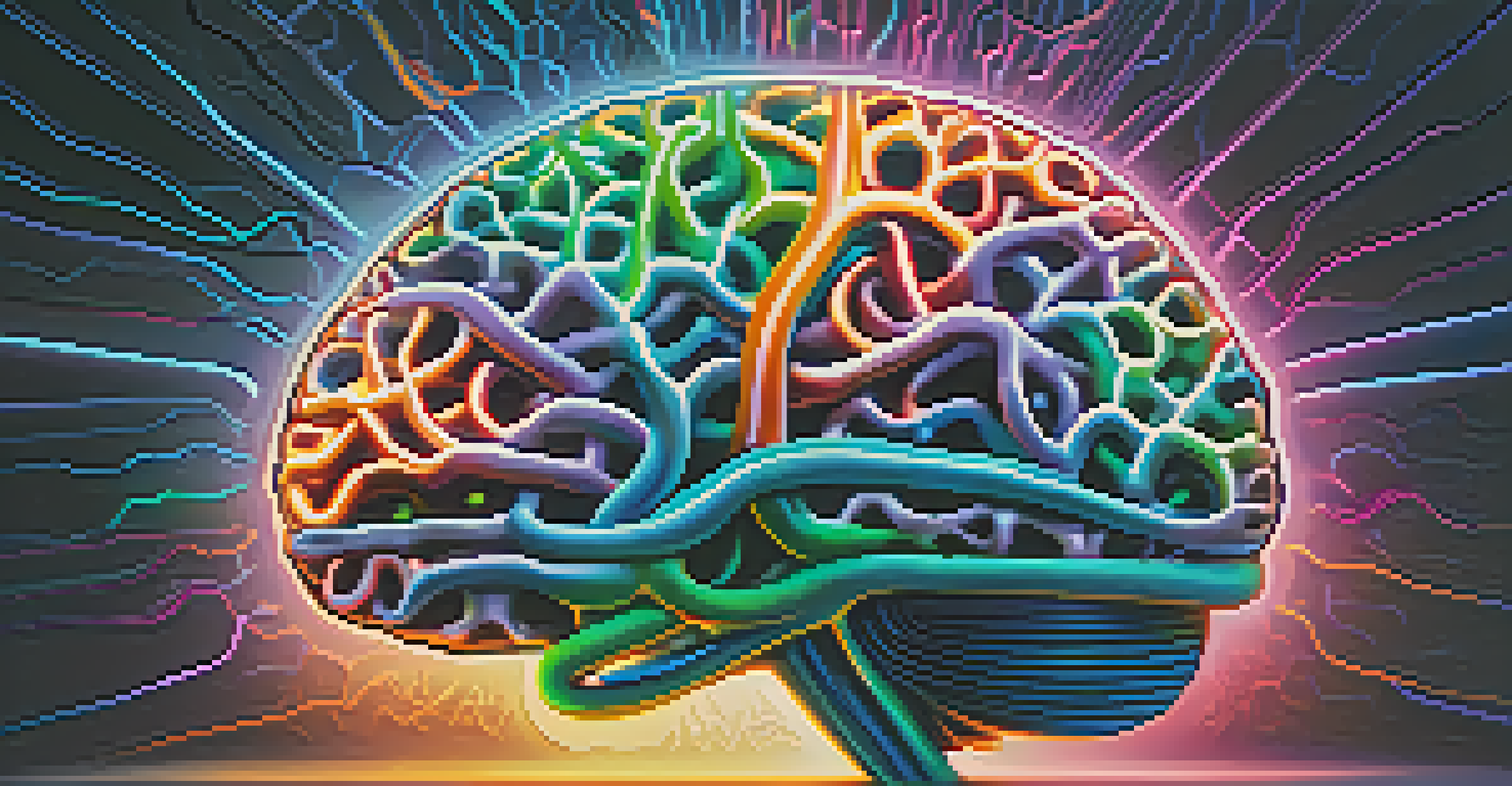AI-Powered Insights for Hallucinogen Therapy Optimization

Understanding Hallucinogen Therapy and Its Benefits
Hallucinogen therapy is gaining traction as a potential treatment for various mental health conditions, including PTSD and depression. By using substances like psilocybin or MDMA, patients can access deep emotional traumas in a safe environment. This therapeutic approach can lead to profound insights and breakthroughs that traditional therapies may not achieve.
The greatest wealth is health.
The benefits of hallucinogen therapy extend beyond immediate emotional relief; many patients report lasting improvements in their mental well-being. These therapies often help individuals confront and process difficult emotions, paving the way for healing. It’s a fascinating area of research, combining ancient practices with modern therapeutic techniques.
However, the effectiveness of hallucinogen therapy can vary widely among individuals, leading to a growing interest in optimizing these treatments. This is where AI-powered insights come into play, offering a pathway to personalize therapy and enhance its impact on diverse populations.
The Role of AI in Analyzing Patient Data
Artificial Intelligence (AI) is revolutionizing how we analyze complex datasets, particularly in healthcare. By sifting through mountains of patient information, AI can identify patterns that might go unnoticed by human researchers. This capability is crucial in hallucinogen therapy, where individual responses to treatment can vary significantly.

Imagine a detective piecing together clues from various sources; that’s essentially what AI does with patient data. It can consider factors like genetic makeup, psychological history, and even real-time responses during therapy sessions. This comprehensive analysis helps to create a more tailored approach to treatment.
Hallucinogen Therapy's Growing Potential
Hallucinogen therapy shows promise in treating mental health conditions like PTSD and depression by facilitating deep emotional healing.
Furthermore, AI can also predict potential outcomes based on historical data, allowing therapists to adjust their methods proactively. This predictive capability means that therapies can be fine-tuned to maximize effectiveness, ensuring that patients receive the best possible care.
Enhancing Patient Engagement Through AI Insights
Patient engagement is a crucial element in any therapeutic process, and AI can significantly enhance this aspect. By providing insights into a patient’s progress, AI tools can help individuals understand their treatment journey better. This understanding fosters a sense of ownership and commitment to the process.
The mind is everything. What you think you become.
For instance, AI can offer personalized feedback after therapy sessions, highlighting key insights or emotional breakthroughs. This kind of immediate reflection encourages patients to engage more deeply with their experiences and can lead to more profound healing outcomes. Think of it as having a personal coach guiding you through your mental wellness journey.
Moreover, AI can facilitate communication between therapists and patients, ensuring that both parties are on the same page. This collaboration not only enhances the therapeutic alliance but also empowers patients to take an active role in their healing process.
Identifying Optimal Dosage with AI Algorithms
Determining the right dosage of hallucinogens is critical for effective therapy. Too little may not yield the desired effects, while too much can lead to overwhelming experiences. AI algorithms can analyze past treatment data to help clinicians find the optimal dosage for each patient, tailoring the experience to individual needs.
By considering various factors like a patient's weight, mental health history, and previous responses to treatment, AI can suggest personalized dosage recommendations. It’s like having a precise measuring tool that ensures each patient receives just the right amount for their therapeutic journey.
AI Personalizes Treatment Approaches
Artificial Intelligence enhances hallucinogen therapy by analyzing patient data to tailor treatment and optimize dosages for individual needs.
Additionally, as more data becomes available, these algorithms can continuously improve, learning from new cases and outcomes. This dynamic approach not only enhances safety but also boosts the overall effectiveness of hallucinogen therapy.
Real-Time Monitoring and Feedback Using AI
One of the most exciting applications of AI in hallucinogen therapy is real-time monitoring. By utilizing wearable technology, therapists can track physiological responses during sessions, such as heart rate and stress levels. This immediate feedback can inform adjustments during the therapy, creating a more responsive and supportive environment.
For example, if a patient's heart rate spikes, AI can alert the therapist to provide additional support or modify the session. This level of responsiveness is akin to having a safety net, ensuring that patients feel secure as they navigate their emotional landscapes.
Moreover, these insights can be invaluable for post-session evaluations, helping therapists understand how patients reacted in the moment. This data can then guide future sessions and strategies, leading to continuous improvement in therapy outcomes.
Ethical Considerations in Using AI for Therapy
As we embrace the integration of AI in hallucinogen therapy, it's essential to address the ethical considerations that come with it. Patient confidentiality and data security are paramount, as sensitive information is being analyzed and stored. Ensuring that this data remains secure while harnessing its power for better treatment is a balancing act.
Moreover, there’s a risk of over-reliance on AI insights, which could potentially overshadow the human element of therapy. While AI can provide valuable information, the therapeutic relationship and human intuition should never be replaced. It’s crucial to find a harmonious balance between technology and human touch.
Ethics in AI-Driven Therapy
As AI becomes integral to hallucinogen therapy, it's crucial to address ethical concerns, ensuring patient confidentiality and maintaining the human touch in treatment.
Additionally, ongoing discussions about the ethical implications of AI in healthcare are vital. This includes ensuring that AI algorithms are free from bias and that all patients receive equitable care, which is especially important in diverse populations undergoing hallucinogen therapy.
Future Directions for AI in Hallucinogen Therapy
The future of AI in hallucinogen therapy is both promising and exciting. As research continues to evolve, we can expect advancements in how AI tools are developed and implemented in therapeutic settings. This evolution could lead to even more personalized treatment plans that consider a wider array of factors.
Imagine a future where AI not only tailors dosages but also suggests specific therapeutic techniques based on individual patient profiles. Such advancements could transform the landscape of mental health treatment, making it more accessible and effective for diverse populations.

Ultimately, the integration of AI into hallucinogen therapy has the potential to revolutionize the way we approach mental health treatment. As we look ahead, collaboration between technologists, therapists, and researchers will be essential in navigating this exciting frontier.